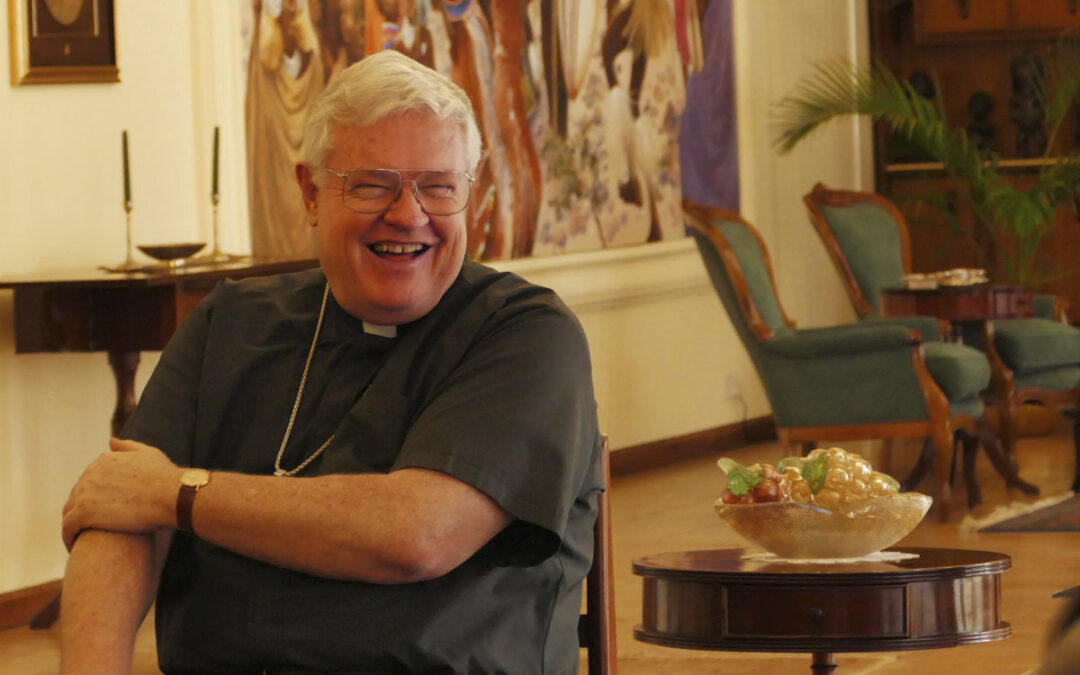
May 30, 2016 | Focolare Worldwide
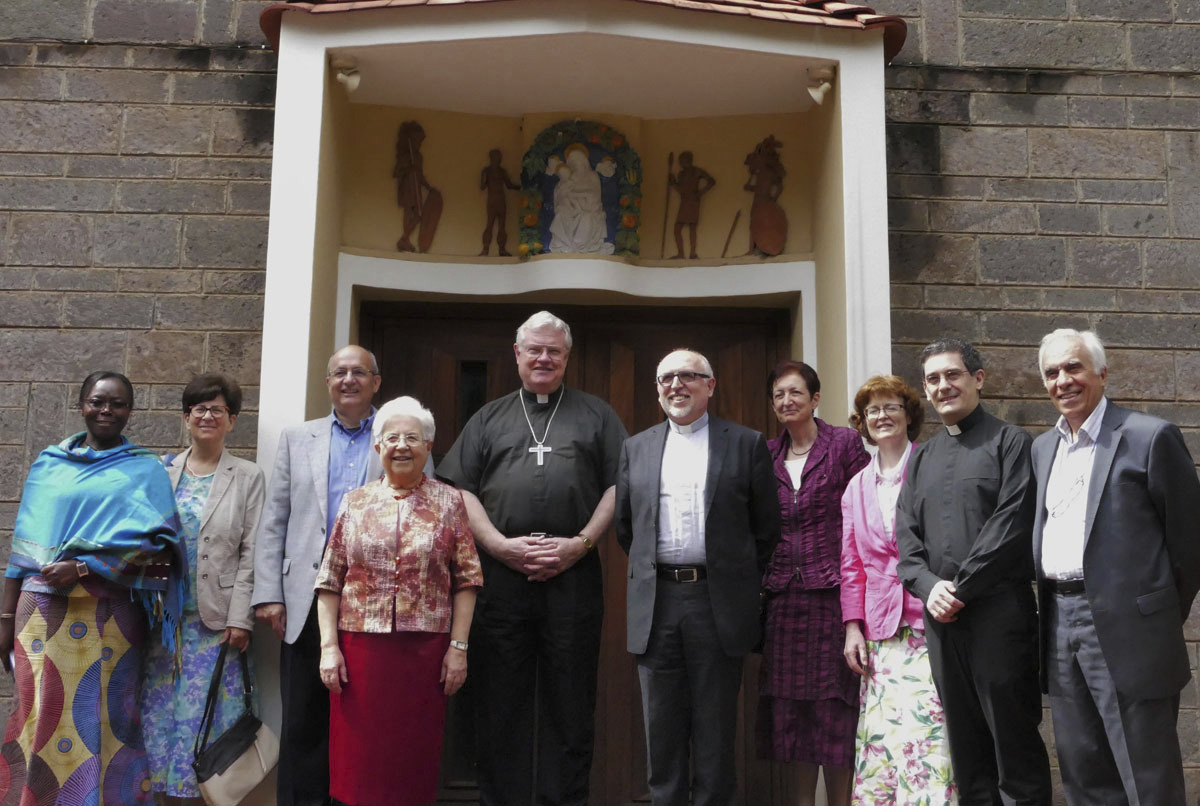 Apostolic Nuncio in Kenya since January 2013, Archbishop Balvo is also the first apostolic nuncio of South Sudan, an independent state since 2011 that has been tried by war, poverty and migrations. Maria Voce and co-president Jesús Morán had met the archbishop at the Nunciature in Nairobi on May 20, 2016 during their visit to Kenya on May 14 – June 1. In a cordial and family atmosphere they shared news and also hopes and concerns over the challenges in the region, especially in South Sudan. They talked about Chiara Lubich who Archbishop Balvo had met during Chiara’s trip to the Middle East in 1999 when the archbishop was serving in Jordan. They also shared about the School of Inculturation that was being held at Mariapolis Piero during those days. He told about his adventure welcoming the Pope to Kenya, and then his visit to the Central African Republic where Christians and non-Christians said “they were struck that the Pope didn’t run away from their problems, and that despite security concerns he spent a night in their country. The archbishop was also updated on news regarding the Focolare, such as the recent surprise visit of Pope Francis to the Mariapolis in the city of Rome. “Pope Francis is the Pope of surprises,” the archbishop responded. But the focus soon shifted to the drama that is taking place in South Sudan. In speaking about the crisis in that region the Nuncio underscored the many challenges: poverty and illiteracy that are worsened because of the lack of peace. In 2007, through AMU, the Focolare had launched a project in the desert around Khartum for the construction of a school for refugees from South Sudan who were living in a camp at the parish of Omdurman. The project, which lasted for several years, was inserted into a diocesan project called “Saving those who can be saved”. The school was built, but afterwards many families returned to South Sudan before it became an independent state.
Apostolic Nuncio in Kenya since January 2013, Archbishop Balvo is also the first apostolic nuncio of South Sudan, an independent state since 2011 that has been tried by war, poverty and migrations. Maria Voce and co-president Jesús Morán had met the archbishop at the Nunciature in Nairobi on May 20, 2016 during their visit to Kenya on May 14 – June 1. In a cordial and family atmosphere they shared news and also hopes and concerns over the challenges in the region, especially in South Sudan. They talked about Chiara Lubich who Archbishop Balvo had met during Chiara’s trip to the Middle East in 1999 when the archbishop was serving in Jordan. They also shared about the School of Inculturation that was being held at Mariapolis Piero during those days. He told about his adventure welcoming the Pope to Kenya, and then his visit to the Central African Republic where Christians and non-Christians said “they were struck that the Pope didn’t run away from their problems, and that despite security concerns he spent a night in their country. The archbishop was also updated on news regarding the Focolare, such as the recent surprise visit of Pope Francis to the Mariapolis in the city of Rome. “Pope Francis is the Pope of surprises,” the archbishop responded. But the focus soon shifted to the drama that is taking place in South Sudan. In speaking about the crisis in that region the Nuncio underscored the many challenges: poverty and illiteracy that are worsened because of the lack of peace. In 2007, through AMU, the Focolare had launched a project in the desert around Khartum for the construction of a school for refugees from South Sudan who were living in a camp at the parish of Omdurman. The project, which lasted for several years, was inserted into a diocesan project called “Saving those who can be saved”. The school was built, but afterwards many families returned to South Sudan before it became an independent state. 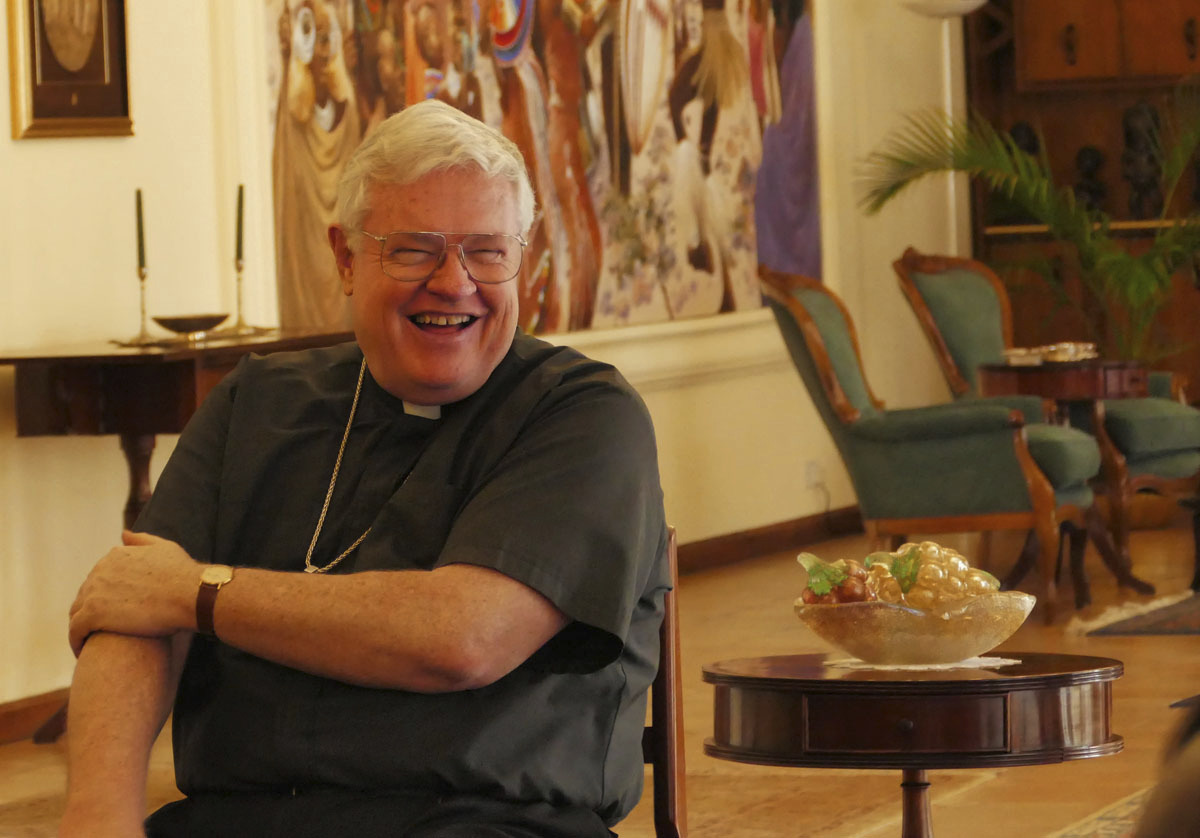 “In a region so rich with resources, it’s going to be difficult to develop them until a stable peace is established,” Archbishop Balvo noted. “It’s really difficult to promote the society with generations of people who have known nothing but violence.” From there he moved on to the history of the country in which he travels so much to demonstrate his love for the people of South Sudan. The South separated from the North on July 9, 2011 following a referendum won by a Sudanese majority in January of the same year. That referendum, which was one of the key points of the peace accord that in 2005, put an end to 21 years of civil war between the government of Khartoum and the group fighting for the independence of South Sudan. The separation of South Sudan remains charged with tension and critical points. Among them are the dividing line between North and South and the status of the region of Abyei which is rich in oil and disputed by both countries. Within South Sudan there are armed groups that threaten the peace, and ethnic conflicts over land, water and livestock disputes are the order of the day. In December 2013, a conflict broke out between government forces and forces loyal to the former Vice President Rieck Machar. In January 2014, the first ceasefire was signed and, on April 26, 2016, Riek Machar returned to the capital and was sworn in as vice president. Maria Voce expressed her hope that this step would return South Sudan to the path of unity and prosperity.
“In a region so rich with resources, it’s going to be difficult to develop them until a stable peace is established,” Archbishop Balvo noted. “It’s really difficult to promote the society with generations of people who have known nothing but violence.” From there he moved on to the history of the country in which he travels so much to demonstrate his love for the people of South Sudan. The South separated from the North on July 9, 2011 following a referendum won by a Sudanese majority in January of the same year. That referendum, which was one of the key points of the peace accord that in 2005, put an end to 21 years of civil war between the government of Khartoum and the group fighting for the independence of South Sudan. The separation of South Sudan remains charged with tension and critical points. Among them are the dividing line between North and South and the status of the region of Abyei which is rich in oil and disputed by both countries. Within South Sudan there are armed groups that threaten the peace, and ethnic conflicts over land, water and livestock disputes are the order of the day. In December 2013, a conflict broke out between government forces and forces loyal to the former Vice President Rieck Machar. In January 2014, the first ceasefire was signed and, on April 26, 2016, Riek Machar returned to the capital and was sworn in as vice president. Maria Voce expressed her hope that this step would return South Sudan to the path of unity and prosperity.
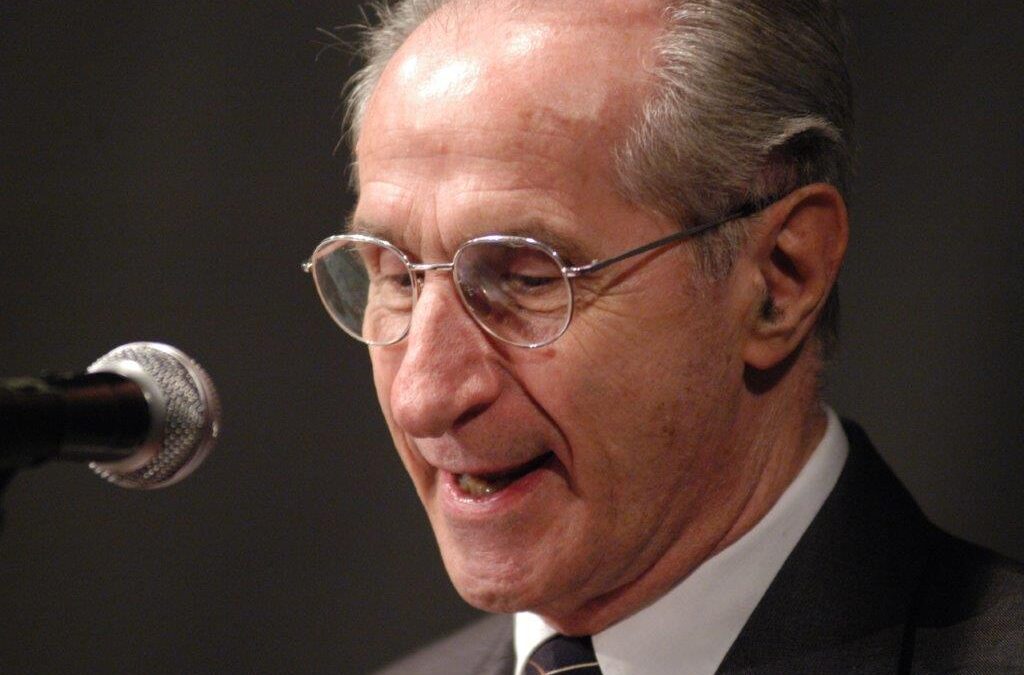
May 29, 2016 | Non categorizzato
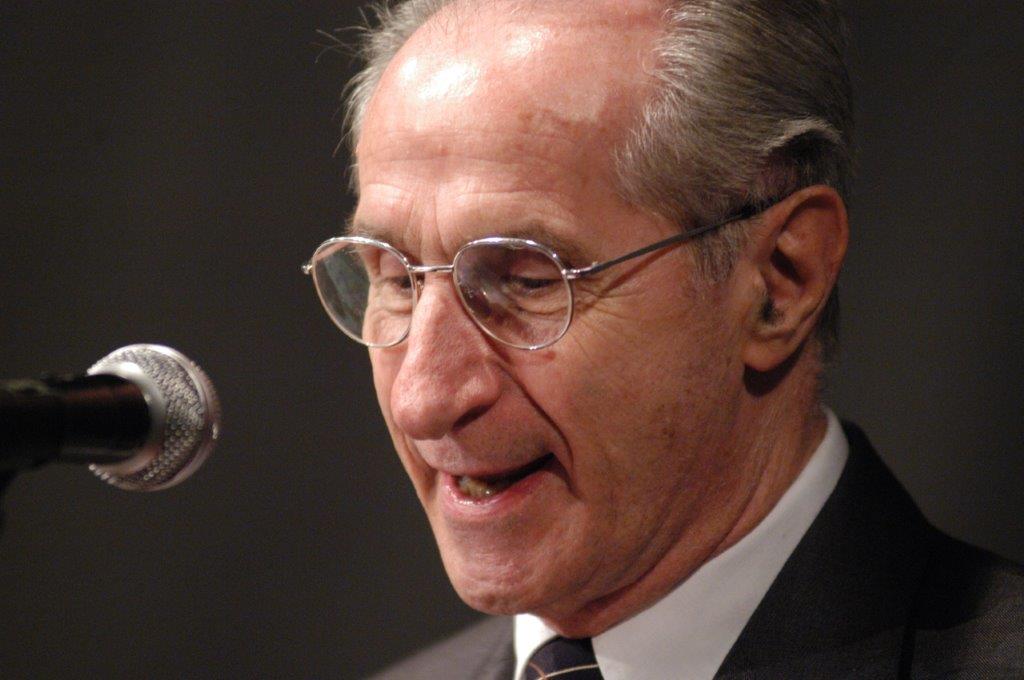 “Here in Africa we got the news at one o’clock this morning, May 20th, the feast day of Corpus Domini. He had more than once expressed his desire to join Chiara Lubich in Heaven. We rejoice with him and pray for him.” Maria Voce wrote these words to all the members of the Focolare Movement, while on a visit to Kenya where she has been since May 14th. Giorgio Fede Marchetti was born in Padua, Italy, on October 16, 1929 where he was amongst the first people to become involved in the adventure of unity, as Chiara Lubich called it. But he also continued to accompany the growth and development of the Focolare around the world. The director of Città Nuova, Michele Zanzucchi, writes: “Many of us will remember his staunch loyalty to Chiara Lubich as he followed the path traced out by the charism of unity during the first months of the Focolare town of Loppiano in Tuscany, Italy, surrounded by mud but also genuine enthusiasm. He’ll be remembered in Brazil where he came face to face with the hard reality of the shanty towns. We’ll remember how he supported the Movement, always on the frontlines, always looking forward.” Ángel Bartol, who was with him in his last moments: “Fede continued to give of himself, body and soul, to the very end. He was a doctor, psychologist and theologian who had trained and accompanied hundreds of young men on the path of the focolarini. Intelligence and generosity were his main traits. Much more could be written about him, and much more will be in the coming days. For now we simply say: Thank you, Fede, for your life that was centered on the unity of the human family! A funeral will be held at the Mariapolis Centre of Castelgandolfo on Tuesday, June 1st at 11:00 am.
“Here in Africa we got the news at one o’clock this morning, May 20th, the feast day of Corpus Domini. He had more than once expressed his desire to join Chiara Lubich in Heaven. We rejoice with him and pray for him.” Maria Voce wrote these words to all the members of the Focolare Movement, while on a visit to Kenya where she has been since May 14th. Giorgio Fede Marchetti was born in Padua, Italy, on October 16, 1929 where he was amongst the first people to become involved in the adventure of unity, as Chiara Lubich called it. But he also continued to accompany the growth and development of the Focolare around the world. The director of Città Nuova, Michele Zanzucchi, writes: “Many of us will remember his staunch loyalty to Chiara Lubich as he followed the path traced out by the charism of unity during the first months of the Focolare town of Loppiano in Tuscany, Italy, surrounded by mud but also genuine enthusiasm. He’ll be remembered in Brazil where he came face to face with the hard reality of the shanty towns. We’ll remember how he supported the Movement, always on the frontlines, always looking forward.” Ángel Bartol, who was with him in his last moments: “Fede continued to give of himself, body and soul, to the very end. He was a doctor, psychologist and theologian who had trained and accompanied hundreds of young men on the path of the focolarini. Intelligence and generosity were his main traits. Much more could be written about him, and much more will be in the coming days. For now we simply say: Thank you, Fede, for your life that was centered on the unity of the human family! A funeral will be held at the Mariapolis Centre of Castelgandolfo on Tuesday, June 1st at 11:00 am.
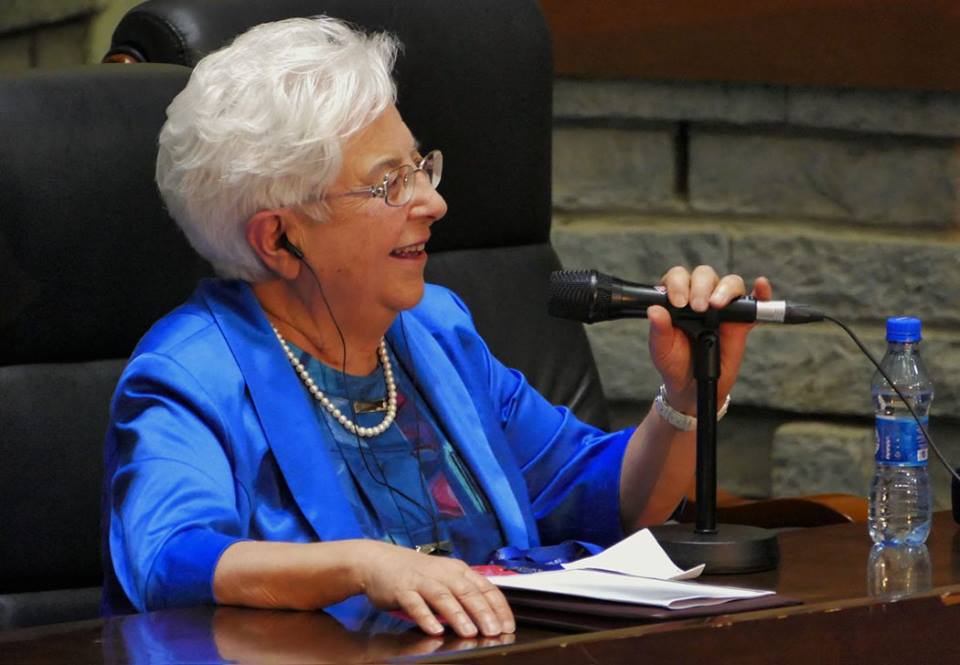
May 29, 2016 | Focolare Worldwide
 Giving law a human face and seeking justice founded on the values of fraternity. This was Maria Voce’s strong message, as a lawyer herself and President of the Focolare Movement, addressing an audience of 300 people gathered on the 25th of May at the Faculty of Law at the Catholic University of Eastern Africa (CUEA) in Nairobi, Kenya. Her audience was composed of students studying law and social sciences, professors, members of the Faculty and staff of the University. In her talk “Law in contemporary society” Maria Voce explained how through the evolution of society, correct behaviour had become organised in systems within communities, and as states achieved political identity these systems were incorporated in their Constitutions, codes and other laws. According to the President of the Focolare, with the coming of Christianity, “a superior law come to the fore as a reference point. It is a law that comes from God, who is Just and was given to humanity through Jesus. It is the law of love.”
Giving law a human face and seeking justice founded on the values of fraternity. This was Maria Voce’s strong message, as a lawyer herself and President of the Focolare Movement, addressing an audience of 300 people gathered on the 25th of May at the Faculty of Law at the Catholic University of Eastern Africa (CUEA) in Nairobi, Kenya. Her audience was composed of students studying law and social sciences, professors, members of the Faculty and staff of the University. In her talk “Law in contemporary society” Maria Voce explained how through the evolution of society, correct behaviour had become organised in systems within communities, and as states achieved political identity these systems were incorporated in their Constitutions, codes and other laws. According to the President of the Focolare, with the coming of Christianity, “a superior law come to the fore as a reference point. It is a law that comes from God, who is Just and was given to humanity through Jesus. It is the law of love.”
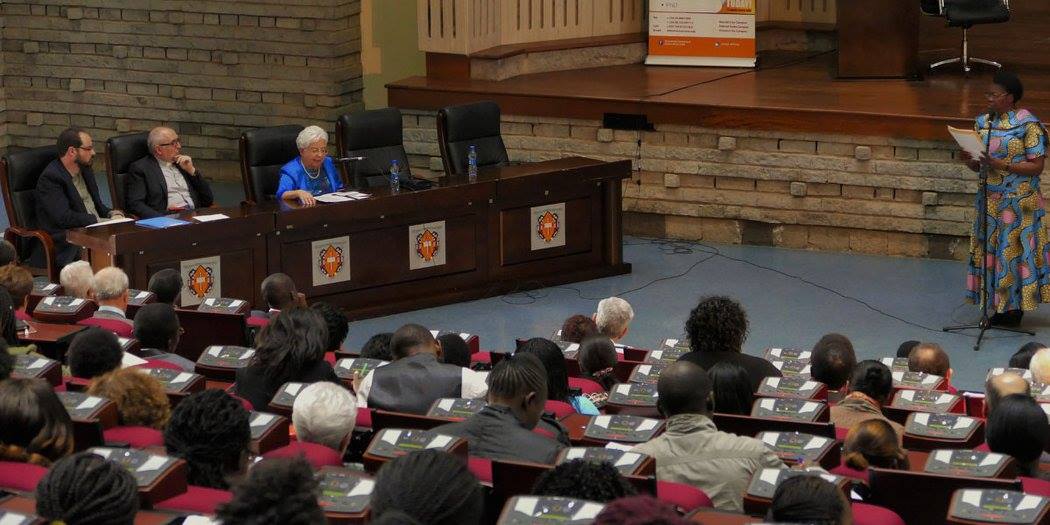
© CSC Audiovisivi – Verônica Farias

© CSC Audiovisivi – Verônica Farias
Willy Niyansaba
Complete text of Maria Voce’s address: Law and Contemporary Society
![Word of Life – June 2016]()
May 28, 2016 | Non categorizzato, Word of
 Listen to the Word of Life
Listen to the Word of Life
How welcome, in the midst of the conflicts that harm humanity in many parts of the world, is this invitation by Jesus to peace! It keeps hope alive when we realize that that he himself is peace and that he has promised to give us his peace. Mark’s gospel places these words of Jesus at the end of a series of things said to his disciples, meeting at home in Capernaum, where he explains how they should live as his community. The conclusion is clear: everything must lead to peace, which contains every good. It is a peace we are called to experience in our daily lives: in our families, at work, with those who have other ideas politically. It is a peace that is not afraid to face contrary opinions, which we need to speak about openly if we want a unity that is always more true and deep. It is a peace that, at the same time, demands that we should take care that our relationship of love never dwindles, because the other person is more valuable than any differences that may exist between us. ‘Wherever unity and mutual love come to be,’ Chiara Lubich once said, ‘there is peace, indeed, true peace. Because where there is mutual love, there is a certain presence of Jesus among us, and he truly is peace, peace par excellence.’1 Chiara’s ‘ideal of unity’ was born during World War II and it immediately looked like the antidote to hatred and ruptures in society. From then on, when faced with any conflict, Chiara persistently continued putting forward the Gospel logic of love. When, for example, war exploded in Iraq in 1990, she expressed bitter surprise at hearing ‘words that we thought had been buried, such as: “the enemy”, “our enemies”, “hostilities are beginning”, and the war bulletins, prisoners, defeats.… We realized with dismay that this was a body blow to the fundamental Christian principle of Jesus’s “commandment” par excellence, his “New Commandment”.… Instead of loving one another, instead of being ready to die for one another’ here is humankind again ‘in the abyss of hatred’: contempt, torture, killing.2 How can we escape? she asked herself. ‘We must knit together, wherever possible, new relationships or a deepening of those that already exist, between those of us who are Christians and the followers of other monotheistic faiths: Muslims and Jews,’ 3 in other words, those engaged in the conflict. The same is true when faced with any kind of conflict. We must knit together among individuals and peoples relationships of listening, of love, as Chiara would also say, to the point of ‘being ready to die for one another.’ It is necessary to set aside one’s own positions in order to understand the other’s, even though we know that we will not always manage to understand them completely. The other too can do the same with me and at times neither will the other, perhaps, understand me and my positions. But we want nonetheless to stay open to the other, even when there is difference and incomprehension, before all else saving our relationship. The Gospel makes it a command: ‘Be at peace.’ Making it a command is a sign that serious and tough commitment is demanded. It is one of the most essential expressions of the love and mercy we are called to have for one another. Fabio Ciardi ___________________________________
- On Bavarian television, 16 September 1
- 28 February 1991, see Santi insieme,(Città Nuova: Rome, 1994), pp. 63-6
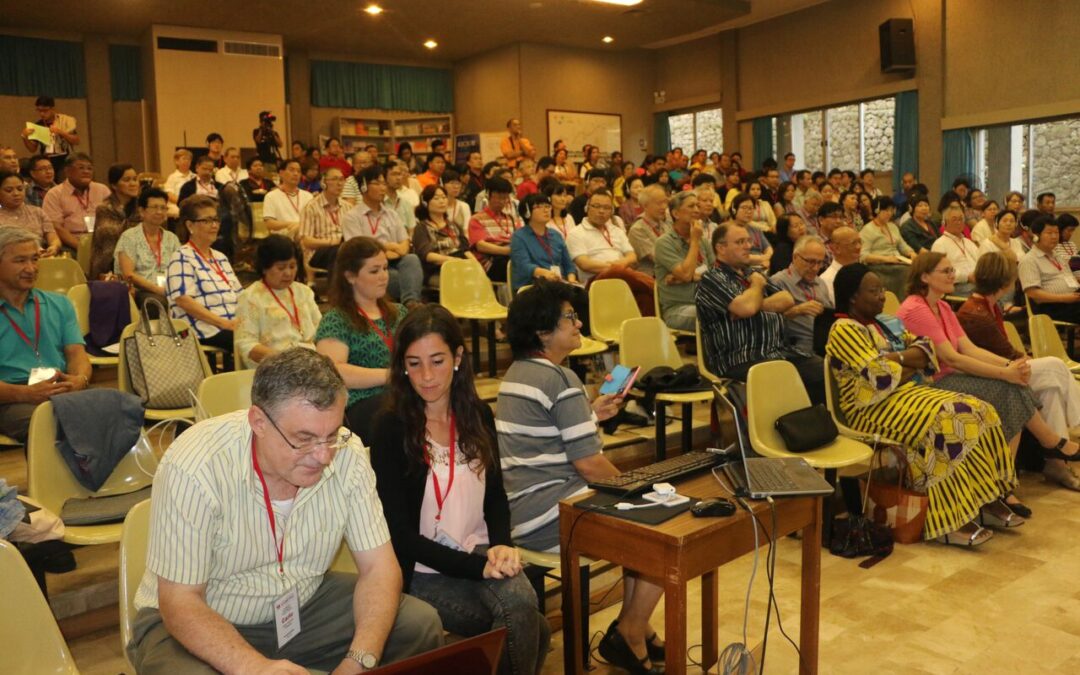
May 28, 2016 | Focolare Worldwide
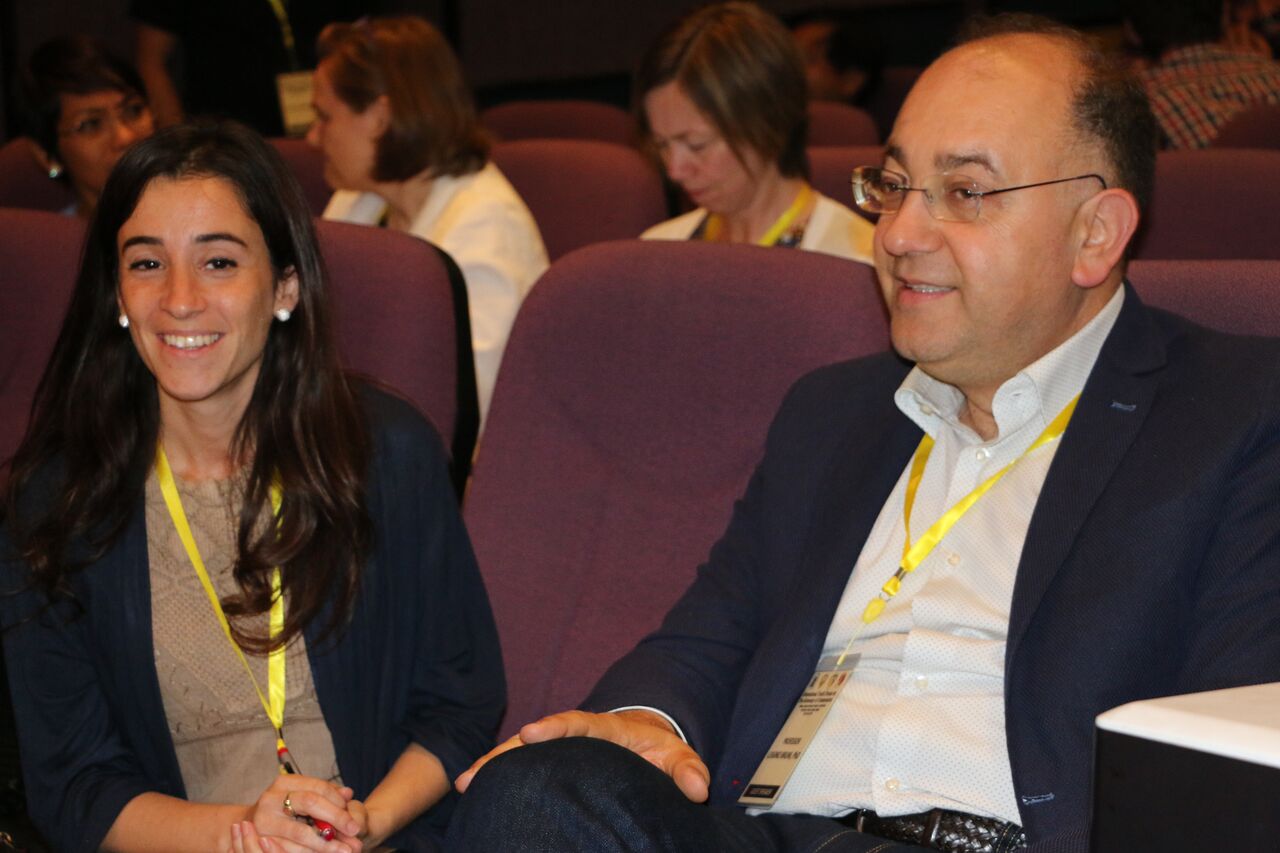 It was precisely on 29 May 1991 that Chiara Lubich, during her visit to São Paolo, Brazil, launched the Economy of Communion project (EoC). Noting the social inequalities in the country, she gave birth to this initiative that soon involved business men and women, workers, students, academics and researchers, the rich and the poor. According to Luigino Bruni, the current international coordinator of the project, the poor are still the focus of the EoC: “It’s impossible to forget the many times that Chiara Lubich, when we worked together for this, emphasised: “Remember that I created the Economy of Communion for the poor.” Still today we have the ethical and spiritual duty to put the issue of poverty and those who are marginalised at the centre of the economic, political and social system.” The poor were the first to witness the newly-born Focolare Movement in Trent, when, during the war, Chiara and her first companions – themselves of humble means – invited the poor to join them at meal times and they shared everything they had with them.
It was precisely on 29 May 1991 that Chiara Lubich, during her visit to São Paolo, Brazil, launched the Economy of Communion project (EoC). Noting the social inequalities in the country, she gave birth to this initiative that soon involved business men and women, workers, students, academics and researchers, the rich and the poor. According to Luigino Bruni, the current international coordinator of the project, the poor are still the focus of the EoC: “It’s impossible to forget the many times that Chiara Lubich, when we worked together for this, emphasised: “Remember that I created the Economy of Communion for the poor.” Still today we have the ethical and spiritual duty to put the issue of poverty and those who are marginalised at the centre of the economic, political and social system.” The poor were the first to witness the newly-born Focolare Movement in Trent, when, during the war, Chiara and her first companions – themselves of humble means – invited the poor to join them at meal times and they shared everything they had with them. 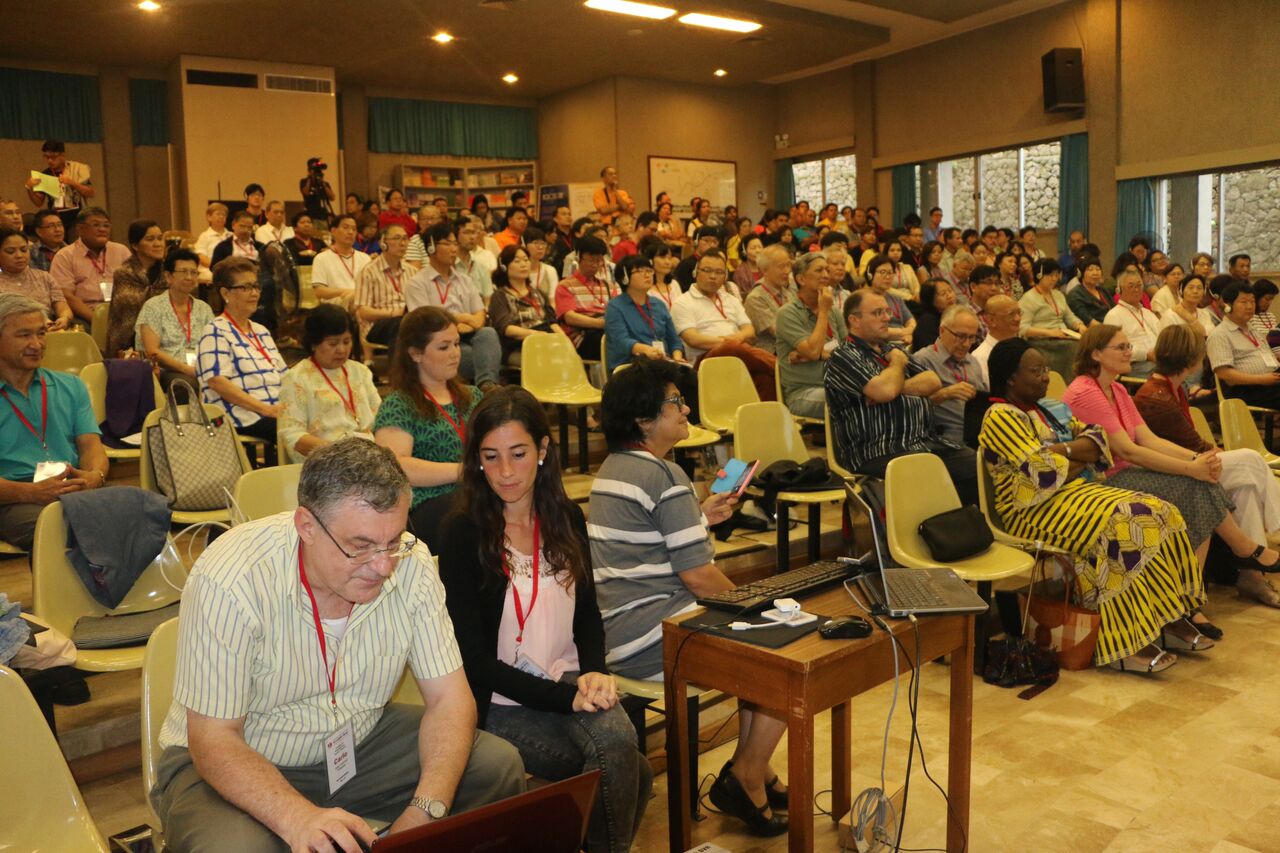 Even today that same spiritual and material communion characterises all those involved in the EoC: its main asset is a community of people united by a vision of a global economy which strives to reduce poverty and inequalities in society. The entrepreneur who adheres to sharing profits is the main protagonist for the interaction between communities and businesses. The 25 years of life of the EoC culminate in an international event being held in the Philippines, Tagaytay (Manila) entitled “Economy of Communion, an Economy for All”. From 25-29 May 25, 250 participants have gathered to reflect on the progress made so far and to discuss future global action plans which include:
Even today that same spiritual and material communion characterises all those involved in the EoC: its main asset is a community of people united by a vision of a global economy which strives to reduce poverty and inequalities in society. The entrepreneur who adheres to sharing profits is the main protagonist for the interaction between communities and businesses. The 25 years of life of the EoC culminate in an international event being held in the Philippines, Tagaytay (Manila) entitled “Economy of Communion, an Economy for All”. From 25-29 May 25, 250 participants have gathered to reflect on the progress made so far and to discuss future global action plans which include:
- establishing an international network of “business incubators” and to create spaces and resources within the industrial parks born through the Economy of Communion and to make these available in order to support first and foremost young business men and women.
- setting up an Observatory on Poverty, to ensure that the tackling of poverty is always central and consistent with the spirit of the EoC, and to help identify the various sites.
- multiplying the Lab-Schools which are technical, professional and business training workshops aimed in particular towards young people.
Asia’s choice for this international event is not random. “Here there are the same segments of society which made an impact on Chiara while she was in Brazil in 1991. But there is also wealth, entrepreneurship, youth. There is a clear link between wealth creation and poverty. “The Economy of Communion, as long as it continues to exist, holds both together” commented Luigino Bruni. “In fifteen years’ time, the share of Asia’s GDP will double that of the United States and Western Europe. The future of the world therefore depends on the type of economy that will grow in Asia. To celebrate here the 25th anniversary of the Economy of Communion means to recognize that its future presence in the Asian continent is crucial.” In conjunction with the conference in the Philippines, there are other conferences being held contemporaneously in various other parts of the world. On Saturday, May 28, at 9.00pm, Manila time, there will be webinar which will be streamed live and which will connect up various countries: Bolivia (Inter-American School of Business), Italy (Lionello Bonfanti Industrial Park in Loppiano), Mexico (Conference of Entrepreneurs in Puebla), Slovakia (a gathering of entrepreneurs from Slovakia and Czech Republic). There will also be the participation of EoC groups from the Ivory Coast, Brazil, Guatemala, Madagascar, Panama, Portugal, Russia, Spain, Uganda. As Luigino Bruni commented, “In a world that perhaps lacks reasons for celebration, the Economy of Communion is the miracle of the bread which is multiplied for the poor, but also like the miracle of the wine at the wedding feast of Cana which is poured out for the rich and poor alike, the miracle of the celebration of universal brotherhood.” Edc-online.org/en/ Press Release – May 27, 2016: An economy for all, rich and poor Streaming playlist: https://www.youtube.com/playlist?list=PLseXirhCvXpHfSeiIcXBqicR4Hfl4dxuB
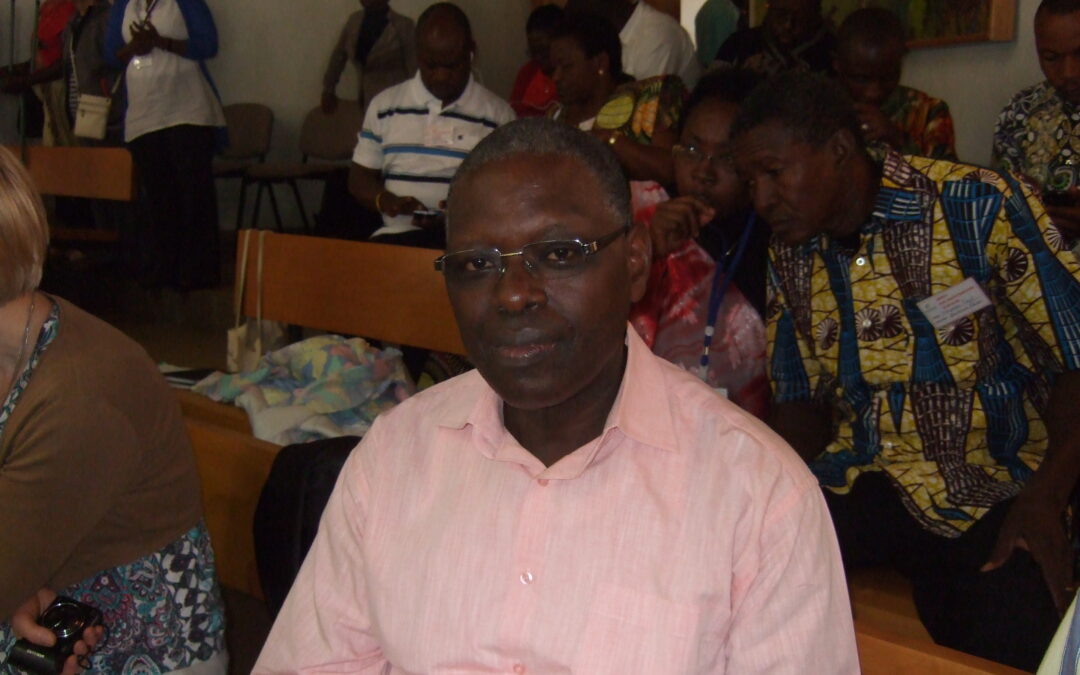
May 27, 2016 | Focolare Worldwide
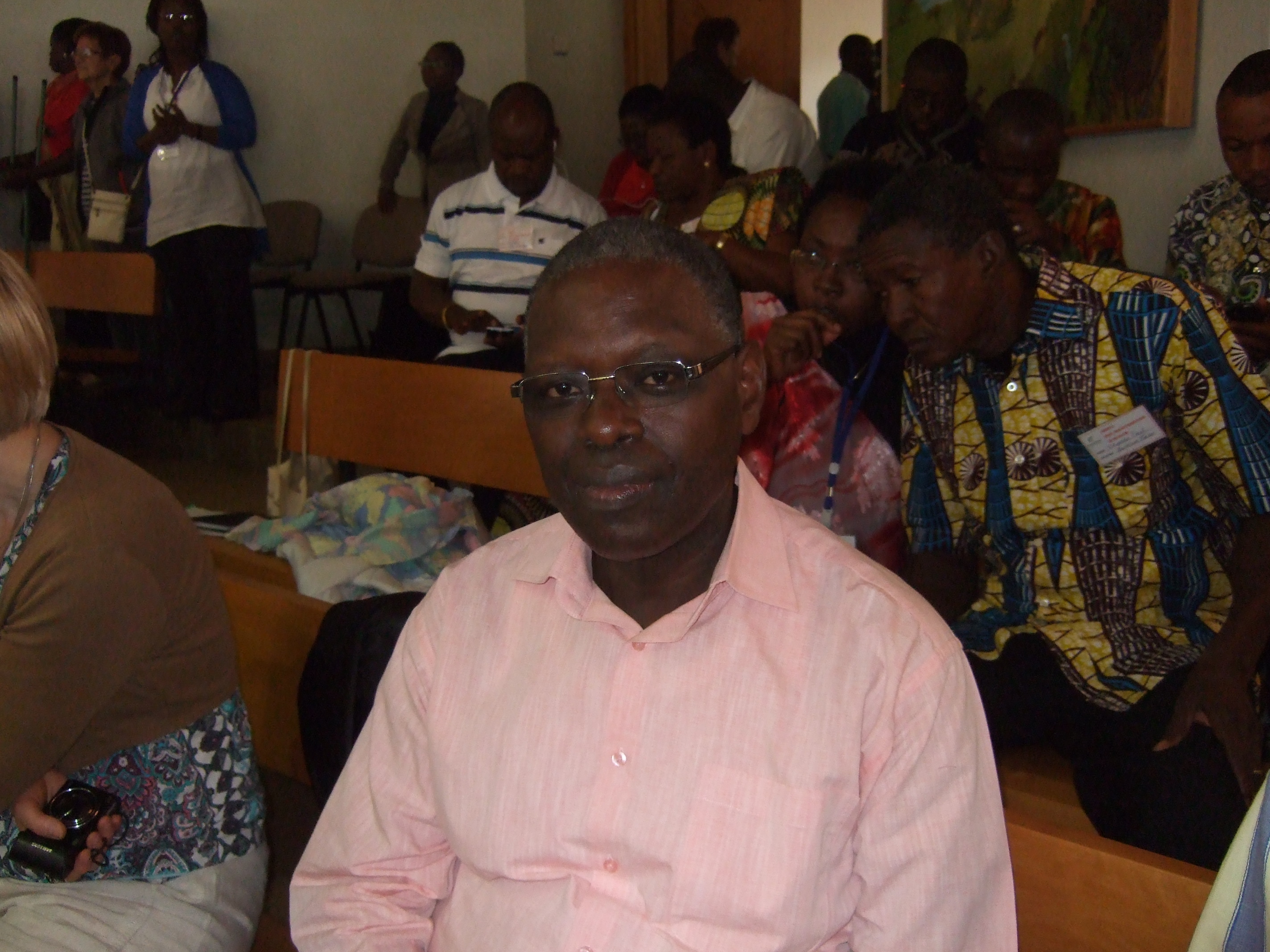 Several concerns were raised during the School of Inculturation, regarding those aspects of the modern world that can overshadow basic African cultural values. Yet, progress and development can never be stopped. In your opinion, what is the way to salvage the values that are contained in the traditions? “I actually think that development can not be avoided. The culture of tradition in African cultures is also always changing. However, modernity does penetrate African traditions with such things as materialism, individualism and the primacy of money and capitalism. I don’t say that money is bad, but the wrong use of money makes us put aside our humanity which in Africa we refer to as ubuntu. But modernity also contains some positive aspects: democracy, human rights, pluralism that leads to the acceptance others and their differences. In some African countries people kill for lack of pluralism; there is a collective sense of self that is very dangerous. In that sense, individualism – a Western value – does not seem entirely negative because if I wish to escape from the collective sense of self, it will take a good dose of individualism. In short, I think there is need for a balance between individualism and pluralism. It’s important to become aware of this and reflect upon it, even though it’s not sufficient in itself.” I think we should illumine the African culture that has been contaminated by the negative values of modernity. I think that this is the point when Christianity must intervene, which looks upon the other person as my path to sanctification. The Gospel invites us to give money the second place. Jesus gives the human person first place, the neigbour. For me this is important, it seems to me the path for salvaging the universal values that are contained in the traditions.” What impressions do you take away with your from these days? What are the challenges to be faced in the daily lives of the African peoples? “Through one simple situation that I found myself in I felt that I could be reborn in these days, like Nicodemus. It was my beginning of the School of Inculturation. The second striking impression was to see the people who are here, to discover that Africa is pluralistic, that there is a pluralism of Africas. I wanted to know every one of them, to understand how they live; to talk with a Cameroonian, who is quite different from a Burundian, a Rwandian, or Ethiopian. Here I experienced Africa’s pluralism. But as Africans, we come together on certain values: solidarity, the family and family relationships, communion, the centrality of our children’s education. This is important for us Afrcicans, even though we are so diverse. For me, the challenge for defeating the internal battles, passes through the incarnation of the words of the Gospel in daily life, social and political life. This is the challenge that rises from these days: When we get home, how will we behave towards people that are different from us? How will we behave towards our enemies? Towards the people who do not belong to my political party, who don’t appreciate me? Will I be capable of loving them? Will I be this pure white light of the Gospel, in society, politics, in the lack of understanding among groups of the same nation? This is the commitment I take away with me: the challenge of our times for overcoming the great problems of Africa.” Compiled by Irena Sargankova
Several concerns were raised during the School of Inculturation, regarding those aspects of the modern world that can overshadow basic African cultural values. Yet, progress and development can never be stopped. In your opinion, what is the way to salvage the values that are contained in the traditions? “I actually think that development can not be avoided. The culture of tradition in African cultures is also always changing. However, modernity does penetrate African traditions with such things as materialism, individualism and the primacy of money and capitalism. I don’t say that money is bad, but the wrong use of money makes us put aside our humanity which in Africa we refer to as ubuntu. But modernity also contains some positive aspects: democracy, human rights, pluralism that leads to the acceptance others and their differences. In some African countries people kill for lack of pluralism; there is a collective sense of self that is very dangerous. In that sense, individualism – a Western value – does not seem entirely negative because if I wish to escape from the collective sense of self, it will take a good dose of individualism. In short, I think there is need for a balance between individualism and pluralism. It’s important to become aware of this and reflect upon it, even though it’s not sufficient in itself.” I think we should illumine the African culture that has been contaminated by the negative values of modernity. I think that this is the point when Christianity must intervene, which looks upon the other person as my path to sanctification. The Gospel invites us to give money the second place. Jesus gives the human person first place, the neigbour. For me this is important, it seems to me the path for salvaging the universal values that are contained in the traditions.” What impressions do you take away with your from these days? What are the challenges to be faced in the daily lives of the African peoples? “Through one simple situation that I found myself in I felt that I could be reborn in these days, like Nicodemus. It was my beginning of the School of Inculturation. The second striking impression was to see the people who are here, to discover that Africa is pluralistic, that there is a pluralism of Africas. I wanted to know every one of them, to understand how they live; to talk with a Cameroonian, who is quite different from a Burundian, a Rwandian, or Ethiopian. Here I experienced Africa’s pluralism. But as Africans, we come together on certain values: solidarity, the family and family relationships, communion, the centrality of our children’s education. This is important for us Afrcicans, even though we are so diverse. For me, the challenge for defeating the internal battles, passes through the incarnation of the words of the Gospel in daily life, social and political life. This is the challenge that rises from these days: When we get home, how will we behave towards people that are different from us? How will we behave towards our enemies? Towards the people who do not belong to my political party, who don’t appreciate me? Will I be capable of loving them? Will I be this pure white light of the Gospel, in society, politics, in the lack of understanding among groups of the same nation? This is the commitment I take away with me: the challenge of our times for overcoming the great problems of Africa.” Compiled by Irena Sargankova
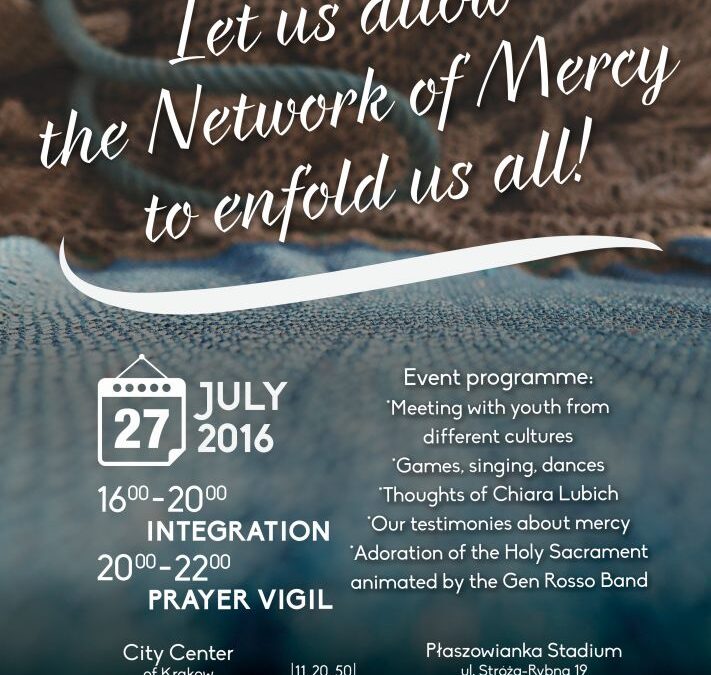
May 26, 2016 | Focolare Worldwide
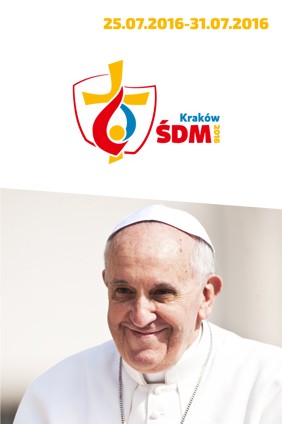 “Blessed are the merciful for they will receive mercy” is the theme of the 31st World Youth Day. “Read the Beatitudes, they will do you a lot of good,” Pope Francis had said to the youth in Rio de Janeiro in 2013, and it was precisely along these lines of the beatitudes that the participants of the WYD are preparing for the event, as part of the Jubilee of Mercy, in a land which – through Sr. Faustina and John Paul II – is strongly linked to the devotion to the Divine Mercy. Among the main events are the Opening Mass (26.07), Welcome Ceremony with the first meeting with the Holy Father (28.07), Stations of the Cross of the World Youth (29.07), to then get to the heart of the WYD: the Wake with the Holy Father (30.07) and Closing Mass (31.07). The programme will be enriched with the catechism sessions in various languages and the Youth Festival, with four spiritual soirees to be matched with artistic-cultural expressions. Also the youth of the Focolare Movement are giving a hand in the WYD preparations, particularly with an event to be held in the context of a Festival in Kracow on 27 July 2016, Sports Club Plaszowianka ul. Stroza-Rybna 19 (tram stop 50, 20, 11). The evening, according to Magda, one of the organizers, will be composed of two parts: “The first will start at 4 pm, with the integration that will help us to know each other better, with dances and game from all over the world. From 8 pm the wake will help us deepen the theme of the works of mercy through experiences, songs, choreographies and writings of Chiara Lubich. All will end with the adoration of the Eucharist.» Magda further explains: «The wake will be enlivened by the international Gen Rosso band – and we want it to be a moment of deep union with God and among us. We want this programme to be a moment of encounter, to overcome all the differences that may divide us.” The organizers continued by saying that the youth of the Focolare will also manage a stand in the Vocational Centre (to be open all week at the Kracow Stadium), which will exhibit all the various initiatives of the ecclesial panorama, to help the youth ponder “what does God expect of me?” “The WYD 2016 is quickly nearing!» Magda wrote, «And we also met last 30 April to 3 May in Kracow, to set out the programme of the Youth Festival. In this meeting we prayed to the Holy Spirit to guide us. We are looking forward to the next step in the Fiore Mariapolis (the Polish town of the Focolare) on 11/12 June, on the occasion of the 20th anniversary of our town. Please support us with your prayers!». Magda also invited all the youth saying: «If you intend to come to Kracow for the WYD and wish to give us a hand, you are most welcome! We shall await your proposals sent to the address: krakow2016@focolare.org. Let us allow the network of Mercy to enfold us all!” Those who wish to go deeper into the WYD experience in the light of the Focolare spirituality will be able to do so by participating in the “post WYD school” in Slovakia (Jasná – Demänovská Dolina) with 550 youths coming from all over the world, among which will also be a group of 50 Orthodox youth. Maria Chiara De Lorenzo
“Blessed are the merciful for they will receive mercy” is the theme of the 31st World Youth Day. “Read the Beatitudes, they will do you a lot of good,” Pope Francis had said to the youth in Rio de Janeiro in 2013, and it was precisely along these lines of the beatitudes that the participants of the WYD are preparing for the event, as part of the Jubilee of Mercy, in a land which – through Sr. Faustina and John Paul II – is strongly linked to the devotion to the Divine Mercy. Among the main events are the Opening Mass (26.07), Welcome Ceremony with the first meeting with the Holy Father (28.07), Stations of the Cross of the World Youth (29.07), to then get to the heart of the WYD: the Wake with the Holy Father (30.07) and Closing Mass (31.07). The programme will be enriched with the catechism sessions in various languages and the Youth Festival, with four spiritual soirees to be matched with artistic-cultural expressions. Also the youth of the Focolare Movement are giving a hand in the WYD preparations, particularly with an event to be held in the context of a Festival in Kracow on 27 July 2016, Sports Club Plaszowianka ul. Stroza-Rybna 19 (tram stop 50, 20, 11). The evening, according to Magda, one of the organizers, will be composed of two parts: “The first will start at 4 pm, with the integration that will help us to know each other better, with dances and game from all over the world. From 8 pm the wake will help us deepen the theme of the works of mercy through experiences, songs, choreographies and writings of Chiara Lubich. All will end with the adoration of the Eucharist.» Magda further explains: «The wake will be enlivened by the international Gen Rosso band – and we want it to be a moment of deep union with God and among us. We want this programme to be a moment of encounter, to overcome all the differences that may divide us.” The organizers continued by saying that the youth of the Focolare will also manage a stand in the Vocational Centre (to be open all week at the Kracow Stadium), which will exhibit all the various initiatives of the ecclesial panorama, to help the youth ponder “what does God expect of me?” “The WYD 2016 is quickly nearing!» Magda wrote, «And we also met last 30 April to 3 May in Kracow, to set out the programme of the Youth Festival. In this meeting we prayed to the Holy Spirit to guide us. We are looking forward to the next step in the Fiore Mariapolis (the Polish town of the Focolare) on 11/12 June, on the occasion of the 20th anniversary of our town. Please support us with your prayers!». Magda also invited all the youth saying: «If you intend to come to Kracow for the WYD and wish to give us a hand, you are most welcome! We shall await your proposals sent to the address: krakow2016@focolare.org. Let us allow the network of Mercy to enfold us all!” Those who wish to go deeper into the WYD experience in the light of the Focolare spirituality will be able to do so by participating in the “post WYD school” in Slovakia (Jasná – Demänovská Dolina) with 550 youths coming from all over the world, among which will also be a group of 50 Orthodox youth. Maria Chiara De Lorenzo 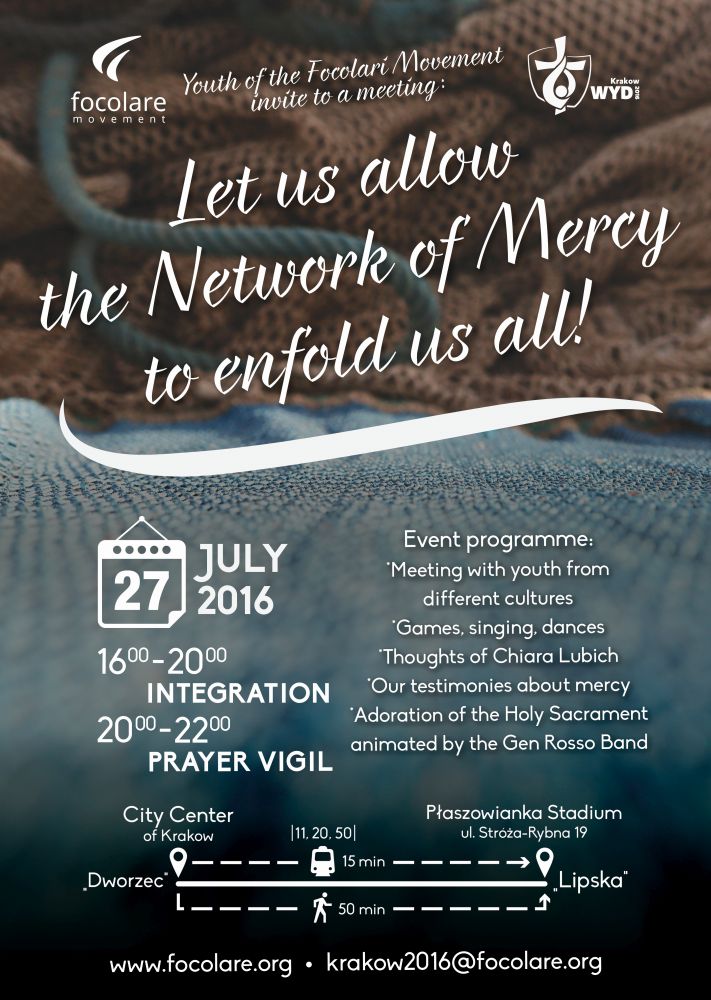
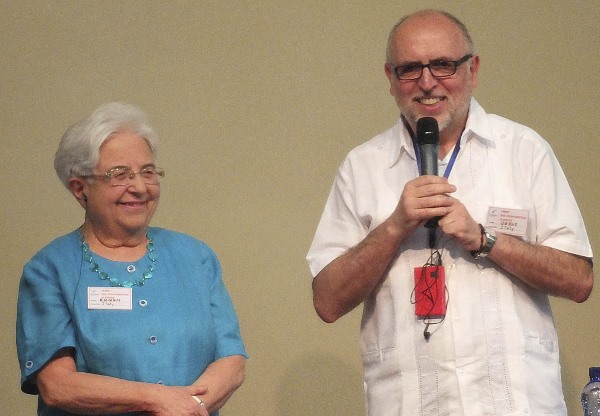
May 25, 2016 | Focolare Worldwide
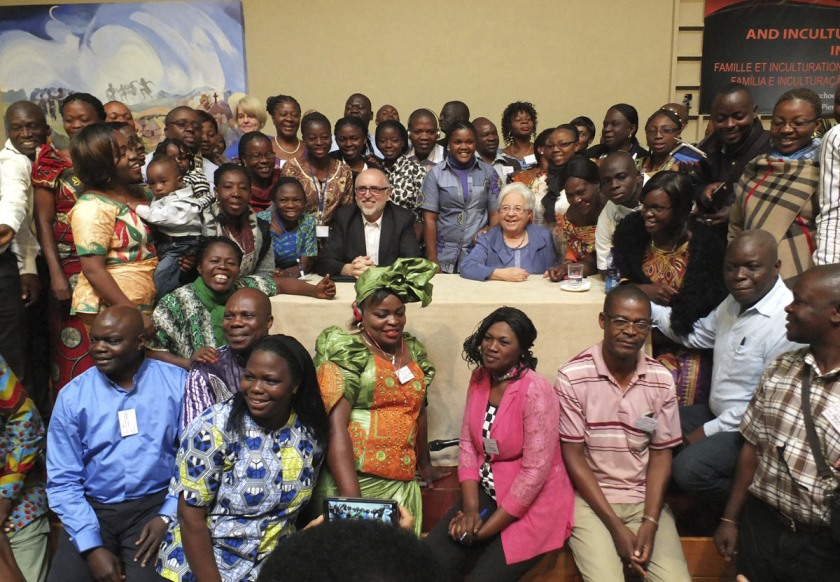 When asked about her thoughts on inculturation today Maria Voce responded: “It’s the incarnation of the light of the Gospel in the African cultures,” She was addressing an audience of 350 people who were attending the School of Inculturation held last week at the Focolare’s permanent Mariapolis Piero near Nairobi, Kenya. There was the same joy and enthusiasm as when Chiara Lubich had placed the first stone of that Mariapolis in 1992, and of the School of Inculturation that would later be erected there. The Focolare foundress had imagined a school for across the board dialogue in the permanent Mariapolis, dialogue between the Gospel and the African cultures, a school that would give a new impulse to evangelization. Co-president Jesús Morán went on to say: “’Making yourself one’ (see Cor. 19:22) has Jesus in his abandonment on the cross for its model, when he made himself nothing for humankind, a nothing of love. Like Him, we should also learn to make ourselves one in front of the different cultures, so that we can then experience that this is never a nothingness that nullifies, but only enriches.” For many of those attending the school, this was also their answer to the many challenges that the African continent faces including inculturation. But it is also an answer to the phenomenon of globalization.
When asked about her thoughts on inculturation today Maria Voce responded: “It’s the incarnation of the light of the Gospel in the African cultures,” She was addressing an audience of 350 people who were attending the School of Inculturation held last week at the Focolare’s permanent Mariapolis Piero near Nairobi, Kenya. There was the same joy and enthusiasm as when Chiara Lubich had placed the first stone of that Mariapolis in 1992, and of the School of Inculturation that would later be erected there. The Focolare foundress had imagined a school for across the board dialogue in the permanent Mariapolis, dialogue between the Gospel and the African cultures, a school that would give a new impulse to evangelization. Co-president Jesús Morán went on to say: “’Making yourself one’ (see Cor. 19:22) has Jesus in his abandonment on the cross for its model, when he made himself nothing for humankind, a nothing of love. Like Him, we should also learn to make ourselves one in front of the different cultures, so that we can then experience that this is never a nothingness that nullifies, but only enriches.” For many of those attending the school, this was also their answer to the many challenges that the African continent faces including inculturation. But it is also an answer to the phenomenon of globalization.  “Inculturation is required,” Morán remarked. “By living the Spirituality of Unity we can draw closer to other people’s cultures with respect for their truth, and discover through dialogue the beauty of our differences not only in Africa but everywhere in the world.” Maria Voce went on: “a world with so many problems on its shoulders because of the lack of peace and harmony. . . By ‘making ourselves one’ as deeply as possible, we promote inculturation which can be a process towards reconciliation.” Since its founding twenty four years ago “the school has developed the tools that were first identified when the school began, and they have reached a second generation.” Looking to the future, “we’re moving into a new phase that may lead to further proliferation of the school.” These words by the president sounded like a “call to new awareness and responsibility” as many observed, to continue on the path of inculturation that Chiara had intuited after first coming into contact with the people of Africa in 1960. The Focolare president particularly stressed the understanding Chiara had in 1992 regarding the light of the Gospel as a pure “white light” capable of penetrating and illumining the diverse cultures making them into a reciprocal gift for one another and for the world. Peter from Cameroon remarked: “Maria Voce pointed our hearts to our particular calling to incarnate the Spirituality of Unity that is never imposed, but as Chiara said is a ‘white light’ that illumines. Globalization has become an unstoppable process in which our specific gift is this life of the Gospel.” Nicodème from Burundi: “As I return home I seem to understand that I have to start from myself, living the Gospel in the midst of society and politics and in the conflicts, so that I can be an answer of love to the expectations of so many African countries. We can’t put this off.”
“Inculturation is required,” Morán remarked. “By living the Spirituality of Unity we can draw closer to other people’s cultures with respect for their truth, and discover through dialogue the beauty of our differences not only in Africa but everywhere in the world.” Maria Voce went on: “a world with so many problems on its shoulders because of the lack of peace and harmony. . . By ‘making ourselves one’ as deeply as possible, we promote inculturation which can be a process towards reconciliation.” Since its founding twenty four years ago “the school has developed the tools that were first identified when the school began, and they have reached a second generation.” Looking to the future, “we’re moving into a new phase that may lead to further proliferation of the school.” These words by the president sounded like a “call to new awareness and responsibility” as many observed, to continue on the path of inculturation that Chiara had intuited after first coming into contact with the people of Africa in 1960. The Focolare president particularly stressed the understanding Chiara had in 1992 regarding the light of the Gospel as a pure “white light” capable of penetrating and illumining the diverse cultures making them into a reciprocal gift for one another and for the world. Peter from Cameroon remarked: “Maria Voce pointed our hearts to our particular calling to incarnate the Spirituality of Unity that is never imposed, but as Chiara said is a ‘white light’ that illumines. Globalization has become an unstoppable process in which our specific gift is this life of the Gospel.” Nicodème from Burundi: “As I return home I seem to understand that I have to start from myself, living the Gospel in the midst of society and politics and in the conflicts, so that I can be an answer of love to the expectations of so many African countries. We can’t put this off.”
May 24, 2016 | Non categorizzato
Five hundred young people from around the world will meet online for a World Peace Conference For Young People The idea emerged from the synergy between Living Peace and its peace education projects for children, adolescents and young adults in 113 countries and Peace Pals International, an expression of the World Peace Prayer Society (WPPS), which is associated with the United Nations (UN). The project is supported by Fuji Declaration from Japan and several international organizations. https://www.youtube.com/watch?v=omANVR3qIDI Inspired by the Fuji Declaration, 14 Christian and Muslim speakers from 14 countries took turns online last April 30th to make known their views in favour of peace, which they backed up with concrete experiences of acceptance and reconcilliation that give credibility to their claim that world peace is possible. Edward’s presentation about his exprience of the earthquake was particularly significant. He is a member of the Focolare from the Philippines and was linked from Ecuador where he had had been in direct contact with earthquake victims. Sherook from Syria also offered her testimony about what she was living through in her country. After telling about the situation in Syria, which is still very fragile and dangerous, she was unable to hold back her tears, which produced an enormous impression and feeling of empthy in everyone. Her tears also triggered very touching words and offers of support from two Muslim young people who were online: Omar from Egypt and Abir from Morocco. The conference was an opportunity to present United World Project and its SignUpForPeace inititiative. Jules Lamore, coordinator of Peace Pals International and member on the committee that organizes the events for World Peace Day in the United Nations, telephoned from New York to congratulate us for the online conference. Two young people were awarded scholarships at Miami University of Luxembourg. The General Coordinator of Living Peace, Carlos Palma, was invited to present the conference at the Seat of the European Parliament in Luxembourg during the World Peace Forum on May 24-25, 2016. In 2015 the Luxembourg Peace Prize had been awarded to New Humanity, an NGO of the Focolare Movement. The World Youth Conference of Young People plans on holding four Conferences a years. The next event is planned for June 25, 2016 with young people from movements and organizations that are engaged in peace work. The third edition of the Conference will be held in Florianopolis, Brazil, at the Peace Forum For Young People (September 22-25) during which Peace Pals will present a gift to the city, a peace obelisk. The fourth Conference, on prospects and commitments for the coming year, is scheduled for December 2016.
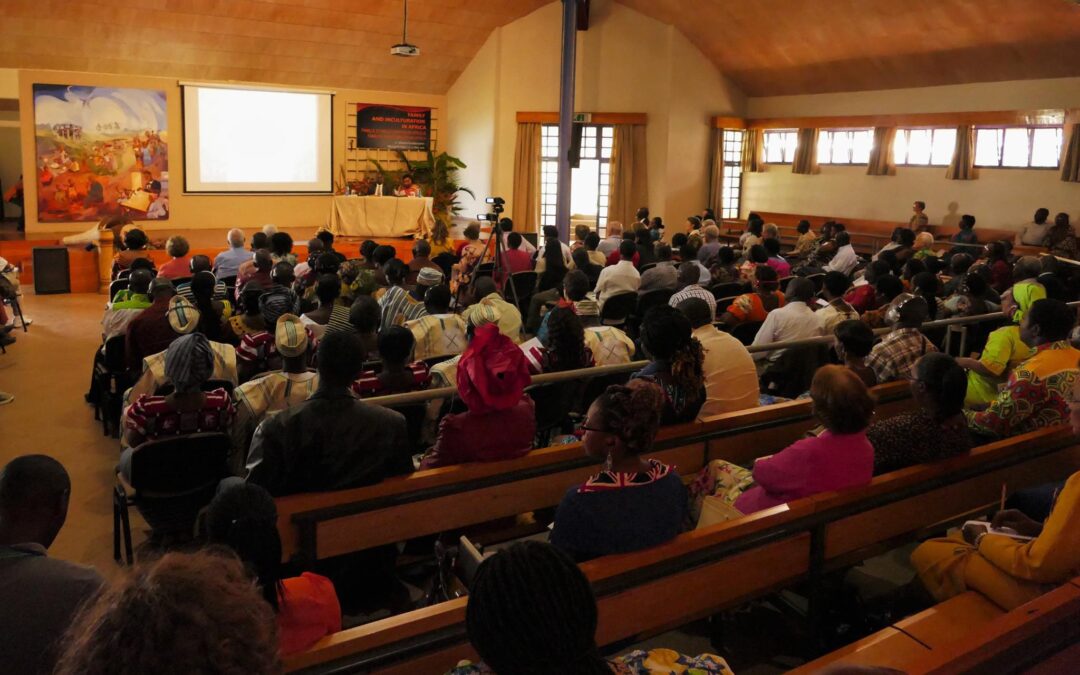
May 23, 2016 | Focolare Worldwide
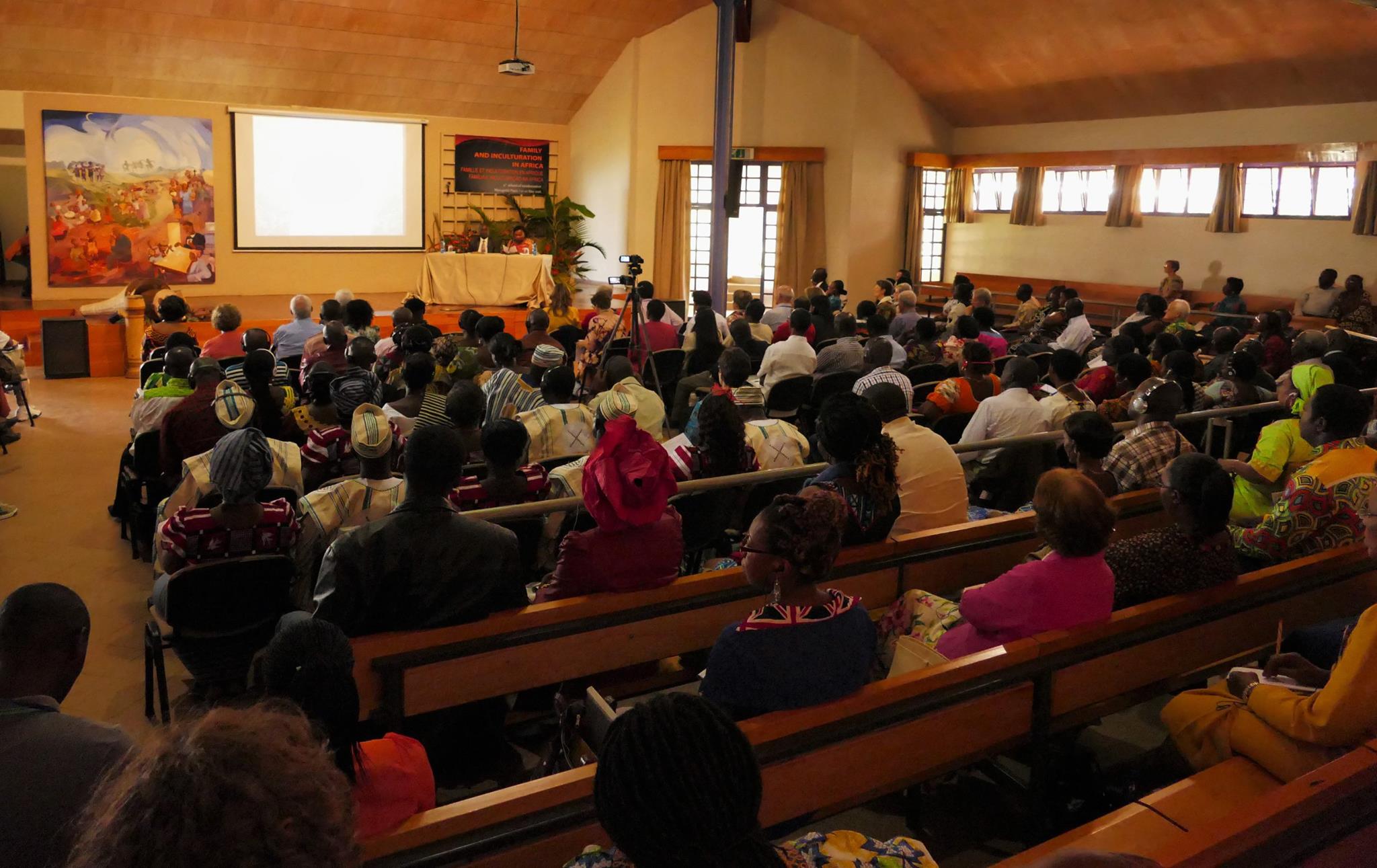 “In our culture,” recounts a Congolese husband after 14 years of marriage, “the first child should be immediately conceived. If after six months a woman still has not conceived, the husband’s family subjects her to stress.” “This is exactly what happened to me – his wife continued. We were already giving half of our salaries to my in-laws who were already in their old age and could no longer work, but this didn’t suffice. They wanted us to have a child who would carry on their lives even after they died. Since nothing happened, my mother-in-law wanted to convince me to go to the quack doctor, and seeing my reluctance, started putting pressure on my husband to ask for a divorce. But he was determined, and though full of respect, told them clearly that he did not give in to their demands because he loved me, and having been married in church, our marriage was “for always.” After three years we decided to adopt two boys, and after 12 years, thanks to a treatment I had in South Africa and our faith in God, we were able to have a daughter, and three months ago, a boy.” “Also my wife,” another Congolese husband continued, “had problems in conceiving. She managed to get pregnant but after a few months would lose the child. Our neighbours said all sorts of things, accusations kindled also by my aunt who did not like my wife. My family had even suggested we make a traditional sacrifice to our ancestors. We explained to them that as Christians, we are not against traditional rites since also in traditions do we find the seeds of the Word, but that we firmly believed in God’s help. One day, a friend of ours, a university professor came to visit, and hearing about our problem, gave us some precious suggestions on how to help the pregnancy progress. Precisely in those days, my wife was five months pregnant, and thanks to his suggestions, her pregnancy continued up to the birth of our child. The same thing happened for the other five children who followed later.” “Upon concluding my studies, “André says, “I found a job in another city, and before leaving, the family got together to give me all the advice they thought I needed. Among these, was that of marrying a girl of my own tribe. I didn’t agree. We had always thought I would marry the one God had planned for me, regardless of where she came from. When I fell in love with Julie, I did not know that she was from a tribe that fought my tribe. I learnt about it later, and it was then that I remembered the instructions of my family. After considerable thought, I understood better what it meant for me to live the Gospel, that is, to succeed in seeing every neighbour not as an enemy, but as a brother, since we are all children of the same Father. So I decided to stick to the principles God had sown in my heart. During our engagement, serious clashes sparked up between our two regions, but Julie and I, despite those difficult times, continued to nurture our relationship until we got married. Our neighbours were certain that our marriage would not last more than six months.” Julie confided: “Even I doubted it would last – but then I saw how faithful André was to me and even if we had different characters, nutritional habits, and mother tongue, we continued to love each other. This year, we celebrated our 23rd wedding anniversary with our four sons. “From the start, each of us had undertaken the commitment to make the other’s family our very own,” André continued, “and with time we managed to get closer to those relatives who initially countered our marriage. In our tradition, giving one’s own name to a child was a demonstration of affection one has for him, a way of immortalizing oneself in him. Julie wanted our sons to have the names of my relatives. With this gesture, also she has been immortalized in my family.”
“In our culture,” recounts a Congolese husband after 14 years of marriage, “the first child should be immediately conceived. If after six months a woman still has not conceived, the husband’s family subjects her to stress.” “This is exactly what happened to me – his wife continued. We were already giving half of our salaries to my in-laws who were already in their old age and could no longer work, but this didn’t suffice. They wanted us to have a child who would carry on their lives even after they died. Since nothing happened, my mother-in-law wanted to convince me to go to the quack doctor, and seeing my reluctance, started putting pressure on my husband to ask for a divorce. But he was determined, and though full of respect, told them clearly that he did not give in to their demands because he loved me, and having been married in church, our marriage was “for always.” After three years we decided to adopt two boys, and after 12 years, thanks to a treatment I had in South Africa and our faith in God, we were able to have a daughter, and three months ago, a boy.” “Also my wife,” another Congolese husband continued, “had problems in conceiving. She managed to get pregnant but after a few months would lose the child. Our neighbours said all sorts of things, accusations kindled also by my aunt who did not like my wife. My family had even suggested we make a traditional sacrifice to our ancestors. We explained to them that as Christians, we are not against traditional rites since also in traditions do we find the seeds of the Word, but that we firmly believed in God’s help. One day, a friend of ours, a university professor came to visit, and hearing about our problem, gave us some precious suggestions on how to help the pregnancy progress. Precisely in those days, my wife was five months pregnant, and thanks to his suggestions, her pregnancy continued up to the birth of our child. The same thing happened for the other five children who followed later.” “Upon concluding my studies, “André says, “I found a job in another city, and before leaving, the family got together to give me all the advice they thought I needed. Among these, was that of marrying a girl of my own tribe. I didn’t agree. We had always thought I would marry the one God had planned for me, regardless of where she came from. When I fell in love with Julie, I did not know that she was from a tribe that fought my tribe. I learnt about it later, and it was then that I remembered the instructions of my family. After considerable thought, I understood better what it meant for me to live the Gospel, that is, to succeed in seeing every neighbour not as an enemy, but as a brother, since we are all children of the same Father. So I decided to stick to the principles God had sown in my heart. During our engagement, serious clashes sparked up between our two regions, but Julie and I, despite those difficult times, continued to nurture our relationship until we got married. Our neighbours were certain that our marriage would not last more than six months.” Julie confided: “Even I doubted it would last – but then I saw how faithful André was to me and even if we had different characters, nutritional habits, and mother tongue, we continued to love each other. This year, we celebrated our 23rd wedding anniversary with our four sons. “From the start, each of us had undertaken the commitment to make the other’s family our very own,” André continued, “and with time we managed to get closer to those relatives who initially countered our marriage. In our tradition, giving one’s own name to a child was a demonstration of affection one has for him, a way of immortalizing oneself in him. Julie wanted our sons to have the names of my relatives. With this gesture, also she has been immortalized in my family.”

 Apostolic Nuncio in Kenya since January 2013, Archbishop Balvo is also the first apostolic nuncio of South Sudan, an independent state since 2011 that has been tried by war, poverty and migrations. Maria Voce and co-president Jesús Morán had met the archbishop at the Nunciature in Nairobi on May 20, 2016 during their visit to Kenya on May 14 – June 1. In a cordial and family atmosphere they shared news and also hopes and concerns over the challenges in the region, especially in South Sudan. They talked about Chiara Lubich who Archbishop Balvo had met during Chiara’s trip to the Middle East in 1999 when the archbishop was serving in Jordan. They also shared about the School of Inculturation that was being held at Mariapolis Piero during those days. He told about his adventure welcoming the Pope to Kenya, and then his visit to the Central African Republic where Christians and non-Christians said “they were struck that the Pope didn’t run away from their problems, and that despite security concerns he spent a night in their country. The archbishop was also updated on news regarding the Focolare, such as the recent surprise visit of Pope Francis to the Mariapolis in the city of Rome. “Pope Francis is the Pope of surprises,” the archbishop responded. But the focus soon shifted to the drama that is taking place in South Sudan. In speaking about the crisis in that region the Nuncio underscored the many challenges: poverty and illiteracy that are worsened because of the lack of peace. In 2007, through AMU, the Focolare had launched a project in the desert around Khartum for the construction of a school for refugees from South Sudan who were living in a camp at the parish of Omdurman. The project, which lasted for several years, was inserted into a diocesan project called “Saving those who can be saved”. The school was built, but afterwards many families returned to South Sudan before it became an independent state.
Apostolic Nuncio in Kenya since January 2013, Archbishop Balvo is also the first apostolic nuncio of South Sudan, an independent state since 2011 that has been tried by war, poverty and migrations. Maria Voce and co-president Jesús Morán had met the archbishop at the Nunciature in Nairobi on May 20, 2016 during their visit to Kenya on May 14 – June 1. In a cordial and family atmosphere they shared news and also hopes and concerns over the challenges in the region, especially in South Sudan. They talked about Chiara Lubich who Archbishop Balvo had met during Chiara’s trip to the Middle East in 1999 when the archbishop was serving in Jordan. They also shared about the School of Inculturation that was being held at Mariapolis Piero during those days. He told about his adventure welcoming the Pope to Kenya, and then his visit to the Central African Republic where Christians and non-Christians said “they were struck that the Pope didn’t run away from their problems, and that despite security concerns he spent a night in their country. The archbishop was also updated on news regarding the Focolare, such as the recent surprise visit of Pope Francis to the Mariapolis in the city of Rome. “Pope Francis is the Pope of surprises,” the archbishop responded. But the focus soon shifted to the drama that is taking place in South Sudan. In speaking about the crisis in that region the Nuncio underscored the many challenges: poverty and illiteracy that are worsened because of the lack of peace. In 2007, through AMU, the Focolare had launched a project in the desert around Khartum for the construction of a school for refugees from South Sudan who were living in a camp at the parish of Omdurman. The project, which lasted for several years, was inserted into a diocesan project called “Saving those who can be saved”. The school was built, but afterwards many families returned to South Sudan before it became an independent state.  “In a region so rich with resources, it’s going to be difficult to develop them until a stable peace is established,” Archbishop Balvo noted. “It’s really difficult to promote the society with generations of people who have known nothing but violence.” From there he moved on to the history of the country in which he travels so much to demonstrate his love for the people of South Sudan. The South separated from the North on July 9, 2011 following a referendum won by a Sudanese majority in January of the same year. That referendum, which was one of the key points of the peace accord that in 2005, put an end to 21 years of civil war between the government of Khartoum and the group fighting for the independence of South Sudan. The separation of South Sudan remains charged with tension and critical points. Among them are the dividing line between North and South and the status of the region of Abyei which is rich in oil and disputed by both countries. Within South Sudan there are armed groups that threaten the peace, and ethnic conflicts over land, water and livestock disputes are the order of the day. In December 2013, a conflict broke out between government forces and forces loyal to the former Vice President Rieck Machar. In January 2014, the first ceasefire was signed and, on April 26, 2016, Riek Machar returned to the capital and was sworn in as vice president. Maria Voce expressed her hope that this step would return South Sudan to the path of unity and prosperity.
“In a region so rich with resources, it’s going to be difficult to develop them until a stable peace is established,” Archbishop Balvo noted. “It’s really difficult to promote the society with generations of people who have known nothing but violence.” From there he moved on to the history of the country in which he travels so much to demonstrate his love for the people of South Sudan. The South separated from the North on July 9, 2011 following a referendum won by a Sudanese majority in January of the same year. That referendum, which was one of the key points of the peace accord that in 2005, put an end to 21 years of civil war between the government of Khartoum and the group fighting for the independence of South Sudan. The separation of South Sudan remains charged with tension and critical points. Among them are the dividing line between North and South and the status of the region of Abyei which is rich in oil and disputed by both countries. Within South Sudan there are armed groups that threaten the peace, and ethnic conflicts over land, water and livestock disputes are the order of the day. In December 2013, a conflict broke out between government forces and forces loyal to the former Vice President Rieck Machar. In January 2014, the first ceasefire was signed and, on April 26, 2016, Riek Machar returned to the capital and was sworn in as vice president. Maria Voce expressed her hope that this step would return South Sudan to the path of unity and prosperity.

 “Here in Africa we got the news at one o’clock this morning, May 20th, the feast day of Corpus Domini. He had more than once expressed his desire to join
“Here in Africa we got the news at one o’clock this morning, May 20th, the feast day of Corpus Domini. He had more than once expressed his desire to join 
 Giving law a human face and seeking justice founded on the values of fraternity. This was
Giving law a human face and seeking justice founded on the values of fraternity. This was 











 “In our culture,” recounts a Congolese husband after 14 years of marriage, “the first child should be immediately conceived. If after six months a woman still has not conceived, the husband’s family subjects her to stress.” “This is exactly what happened to me – his wife continued. We were already giving half of our salaries to my in-laws who were already in their old age and could no longer work, but this didn’t suffice. They wanted us to have a child who would carry on their lives even after they died. Since nothing happened, my mother-in-law wanted to convince me to go to the quack doctor, and seeing my reluctance, started putting pressure on my husband to ask for a divorce. But he was determined, and though full of respect, told them clearly that he did not give in to their demands because he loved me, and having been married in church, our marriage was “for always.” After three years we decided to adopt two boys, and after 12 years, thanks to a treatment I had in
“In our culture,” recounts a Congolese husband after 14 years of marriage, “the first child should be immediately conceived. If after six months a woman still has not conceived, the husband’s family subjects her to stress.” “This is exactly what happened to me – his wife continued. We were already giving half of our salaries to my in-laws who were already in their old age and could no longer work, but this didn’t suffice. They wanted us to have a child who would carry on their lives even after they died. Since nothing happened, my mother-in-law wanted to convince me to go to the quack doctor, and seeing my reluctance, started putting pressure on my husband to ask for a divorce. But he was determined, and though full of respect, told them clearly that he did not give in to their demands because he loved me, and having been married in church, our marriage was “for always.” After three years we decided to adopt two boys, and after 12 years, thanks to a treatment I had in